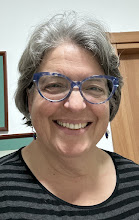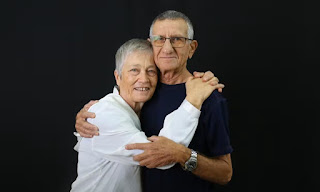No Revenge
On the morning of February 20, 2024, nineteen of us from Silicon
Valley, calling ourselves the South Bay Solidarity Mission to Israel, walked to
the Abraham Hostel at 21 Levontin Street in Tel Aviv, and descended the stairs
from the lobby to a basement meeting room. There we met Maoz Inon,
one of the bravest and most inspiring people I’ve ever met.
Maoz started his story with tragedy. On October 7, 2023, his
parents, Yakov and Bilha Inon, were murdered in their home, a wooden house in
Netiv HaAsara, along with 18 of their neighbors (out of a total population of
about 900 people). Yakov was 78. Bilha was just shy of her 76th
birthday. According to Maoz’s brother Magen’s account,
“My siblings and I received a short message from my parents saying that they
could hear gunshots. They said they were safe inside the house and had locked
the doors. This was the last time we heard from them.”
Maoz told us that his first reaction was that “nothing can
prepare you” for the crushing reality of such a devastating loss. But as he
reflected on his own life, his parents’ lives, and their legacy, he said that
his thinking transformed, and that he realized that “all my life was just a
preparation” for this moment.
Netiv HaAsara (Hebrew: נְתִיב
הָעֲשָׂרָה, which means "Path
of the Ten") is a moshav (cooperative agricultural community) in southern
Israel, close to the northern border of Gaza. After the Israeli disengagement
from Gaza in 2005, Netiv HaAsara became the closest Israeli community to Gaza,
only 400 meters away from the northernmost Gazan city of Beit Lahia (Arabic: بيت لاهيا, which means "House
of Lahia").
During their time of mourning, Maoz and his four siblings collectively
decided—in the aftermath of their very personal tragedy—to send a universal
message to the world: no revenge. Maoz said they’ve experienced an
amazing outpouring of solidarity in response to their pacifist stance.
Maoz lives with his wife and family in a community of 16,000
in the north of Israel, about 140 kilometers and 2 hours’ drive from the idyllic
farming community where he and his siblings grew up. His parents were part of two
different groups of Zionist pioneers, Yakov from the Gordonia Youth Movement (Kibbutz Nir Am) and Bilha from HaShomer HaTzair (Kibbutz Ruhama).
Living into The Legacies of Yakov and Bilha
~ Maoz Inon
if we have the courage to chase them
~ Bilha Inon
Show respect to others - and it will be returned to you in kind
Maoz has traveled the world, backpacking trails across Israel (“Shvil Israel”), North America (John Muir’s famous Pacific Crest Trail) and South America as well. It was in a small guest house in an indigenous community in Ecuador that Maoz saw how tourism, done well, can benefit the traveler while empowering the local community. He came home and was inspired to create the Fauzi Azar guesthouse in the Arab community of Nazareth, the largest city in the north of Israel. His hospitality business, established in the abandoned Azar mansion in Nazareth’s old city, initially aroused a lot of suspicion from locals, and Maoz decided to build trust by doing three things — not displaying any Israeli flags, not installing any cameras, and leaving the main door to the guesthouse always open.
Since the establishment of the Fauzi Azar guesthouse,
more than 50 shops have cropped up in Nazareth’s Old City and begun thriving,
and others are looking for properties to establish more guesthouses and hostels
in Nazareth. From the very beginning, Maoz was advised by a member of the Azar
family to show respect to local citizens, and he’d see that it would get returned
in kind. In fact, Maoz has been so embraced by the local Nazarene community
that he held one day of shiva (mourning) for his parents in Nazareth, and
hundreds came, very emotional, to show their support for him and his family in
the wake of their unspeakable tragedy.
We Are Very Close to Peace
Hope is not just a feeling, it’s something you need to make and create.
~ Hamze Hawawde
At this point in our visit, Maoz turned to sharing some of his own thoughts and wisdom with us. He said that worldwide, we are facing three global crises: (1) economic, (2) environmental, and (3) socio-political. He quoted Hamze Hawawde by saying that hope is an action—like love. He called on all of us to amplify voices of peace and reconciliation, and to pour all the energy we have into creating hope and a better future for all of us to live side by side.
Maoz then asked for my journal so he could sketch his vision for us (see image). He said we are all family, we started out together, and now we’ve been living a parallel existence — we’ve been apart, but we are traveling the parallel paths, perhaps in conflict, but still side by side. He said that today, after October 7th, it may seem like we are even farther apart than ever, making things seem hopeless, but it’s possible for us to come back together again. Maoz reminded all of us in the room to go back and look at examples from history, such as the Anwar Sadat story in making peace with Israel over the Sinai Peninsula, and we will see the rhythms of peace making and hope building. Maoz believes with every cell of his being that we are only four to six years away from our destination of peaceful coexistence between Israelis and Palestinians.After Maoz finished sketching, he gave me back the journal with
a humongous hug and invited all of us to climb back up out of the basement and
take the stairs all the way up to the roof of the Abraham hostel (the building
used to be an old Bezeq telephone exchange and post office). We entered a lovely
rooftop garden, which in the spirit of Yakovi also served as an ecological
experiment to understand the benefits of having a “living roof” on the top of
an urban building.
I wrote down two quotes that Maoz said toward the end of our
time together that really stuck with me:
“It was difficult for me to listen to you and so I
listened twice.”
-and-
“I don’t agree with you, but I’m proud of you.”
Sometimes, in the midst of my grieving for October 7, it’s hard for me to embrace Maoz’s incredible optimism, but that morning I felt inspired to try. Maoz, I’m going to listen to your words and to your story again and again and try to let them settle into my cells like a legacy. It is still difficult for me to really feel that optimism in the midst of the crushing loss, so I’m going to listen, and keep listening, as many times as it takes.
We can’t fix what
happened to grandma and grandpa,
but we can fix the world for our kids.
~ Magen
Inon
For those interested in learning more, Maoz Inon will be
speaking next week, on March 17th, at an online event co-hosted by Ha’Aretz
and the Y&S Nazarian Center for Israel Studies at UCLA:
Israel After October 7 | Mar. 17, 2024 | Online | 9 AM (PST), 12 PM (EST), 6 PM (Israel)
Click here for more info and to see names/titles of speakers




Comments
Post a Comment